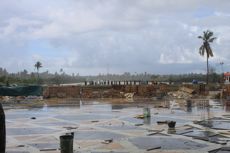Additional reporting by JJ Robinson.
Council heads and senior civil society figures have slammed the judiciary, state authorities and welfare groups over their systemic failure to protect a 15 year-old girl convicted of fornication and sentenced to flogging, despite her history of alleged sexual abuse dating back to 2009.
While the case has only recently received global media coverage, local councilors and woman rights groups told Minivan News that authorities failed for years to address “public uproar” over the child’s alleged abuse.
The girl from the island of Feydhoo in Shaviyani Atoll is currently in the care of the Ministry of Gender and Family. She was identified as a victim of child abuse last year after the body of a dead baby was discovered buried in the outdoor shower area of her family home.
Her stepfather was later charged child sexual abuse, possession of pornographic materials and committing premeditated murder, while her mother also faces charges for concealing the alleged sexual offences.
However, during the course of investigations into the case, officials told Minivan News that the state had no choice but to press fornication charges against the minor after she confessed to having what she claimed was consensual sex with an unidentified man. She now faces 100 lashes in public when she turns 18 – a sentence the President’s Office this week said it would try to avert amid growing international censure and debate over corporal punishment and reform of the country’s Sharia-based judicial system.
The case has led to intense global media scrutiny and an online campaign by petition website Avaaz.org, which gathered almost a million signatures in two days – more than the number of tourists who visited the country last year.
With Maldivian authorities and child protection bodies now in the global spotlight, Aneesa Ahmed, Chairperson for the Hope for Women NGO, said councilors from Shaviyani Atoll had been expressing concerns to authorities about the girl’s safety for several years.
Aneesa said the inaction of a wide variety of institutions in response to these concerns reflected the state’s failure “at every level” to try and protect from abuse.
“All institutions, including the counsellor – if she had one while being interrogated by police – failed, because I am told her case was reported as early as 2009,” she added.
Speaking on Thursday (March 21), Atoll Council President Moosa Fathy said police had conducted numerous investigations into the girl’s situation since 2009 in response to concerns raised by councillors on Feydhoo.
However, Fathy said the girl had ultimately been left in the custody of her mother and stepfather even after she was found to pregnant. He blamed the “limited facilities” available to house and protect the girl, as well as a lack of budget, management and staff to shelter vulnerable young people.
“The police thoroughly investigated the matter, but the response of many organisations simply was not good enough,” Fathy said. “Even now the problem has not been solved.”
Fathy said that rather than blaming a single state or civil society organisation for the girl’s ongoing abuse, every institution charged with the girl’s care had to take responsibility for the matter.
“This girl needed special care. There are special shelters where she would have been safe, but I understand there is not enough budget or staff and general administrative mechanisms to run such programs,” he said.
Fathy said he had been raising concerns about the girl’s welfare for the last two years, and said he had also tried unsuccessfully to meet with former Gender Minister Dhiyana Saeed while she was still in her post to discuss the case.
Island uproar
Sources on Feydhooo have meanwhile told Minivan News that concerns had been raised by islanders since 2009 that the girl had potentially been the victim of sexual abuse not just by her stepfather, but a number of other unidentified men on the island.
However, the island council claimed the victim’s unwillingness to tell authorities about her alleged abuse meant she remained living with her mother and stepfather.
Island Councillor Ibrahim Naushaad told Minivan News that upon discovering the child was pregnant last year, police and the Gender Ministry failed to remove the girl to a shelter.
“The police and gender ministry didn’t take responsibility or provide counselling to the girl,” he said. “The police and ministry investigated, but we don’t know what she said to them.”
Naushaad said the minor presently remained under the care of the Gender Ministry as she was unable to be returned to Feydhooo, as her biological father was being severely disabled and unable to support or look after his daughter.
“Same thing could happen again”
Naushaad alleged that several men on the island who were also believed to have had sex with the minor remained unidentified, leaving her at risk of further abuse should she return to the island.
“The Human Rights and Gender Ministry asked if they could send her back to the island, but I have explained that her father would be unable to look after her and keep an eye on her,” he said. “If they send her back here, the same thing could happen again.”
According to Naushaad, the minor was questioned by police on at least four separate occasions, but he said she had been unwilling to state whether she had faced sexual abuse from her family or other men on the island.
Sources on the island said that the perception was that the minor, along with her mother and stepfather, were believed to have been “lying” to police investigators.
Naushaad told Minivan News there remained concern among islanders that the girl had now been charged by the country’s court with fornication, after being found guilty of having sex with an unidentified partner.
“They did not identify who this man was and that is why we have concerns about what they are doing. This is not good,” he said.
Naushaad claimed the council done everything it could to try and take responsibility for the matter by continually raising concerns with authorities since back in 2009.
Legal review
After the minor was first charged with fornication in January, the government pledged to review the use of flogging as a punishment and legal practices it claimed, in certain cases, criminalise victims of sexual abuse.
While there is no timetable for reforms to be put in place, President’s Office Spokesperson Masood Imad expressed hope on that punishments such as flogging would be debated and one day repealed.
“I’m sure when we debate [punishing suspects for fornication with lashes], we will find an acceptable solution for all parties,” he said.
The Maldives constitution does not allow any law contradicting the tenets of Islam, and the legal system defaults to Sharia law in areas not covered by common law.
The last statistics available from the Department of Judicial Administration on flogging sentences show that 90 percent of the people found guilty of “Zina” – fornication – and sentenced to flogging in 2011 were female.
A total of 129 fornication cases were filed in 2011 and 104 people sentenced, out of which 93 were female. This included 10 underage girls (below 18), 79 women between age 18-40 and and four women above 40 years.
Of the 11 males who were sentenced, only one was a minor, with the others aged between 25-40.
Compared to 2010, the overall sentences in fornication increased by 23 percent in 2011, but the number of males sentenced for flogging decreased by 15 percent while the women increased by 30 percent.
According to Maldivian law, a person found guilty of fornication is subjected to 100 lashes and sentenced to one year of house arrest or banishment while a minor’s flogging is postponed until she or he reaches 18.
History of selective enforcement
Masood noted that the Maldives had a tradition of turning away from practices such as the death sentence and forms of corporal punishment, even where these were proscribed in Sharia.
According to Masood, punishments such as removing the hand of a suspect in the case of theft had not been used since the 1960s.
He maintained that there was a history of reviewing the country’s relationship with Sharia law in the past and that a similar process could be had with the debate about flogging.
However, Masood said that all authorities involved in proposed legal reforms would have to tread “a very fine line” in order to tackle long standing “traditions” and beliefs in the country.
“Reforms must be undertaken, but this must be done gradually considering we are dealing with a process embedded in society,” he said. “A certain amount of compromise may be needed.”
Masood said the state was committed to preventing the minor from facing her sentence, while also looking at the potential for reversing the use of flogging as a traditional punishment.
“The little girl will not be flogged for another two years, so we must look at what can be done [in the meantime],” he said.
However the conservative religious Adhaalath Party – the members of which largely dominate the Maldives’ Ministry of Islamic Affairs – has already publicly warned that “no one has the right to criticise any penalties specified in Islam.”
Quoting verses from the Quran, a statement from the party said that no citizen should be allowed to express ideas and opinions about a verdict made in accordance with the religion in a court of law in a 100-percent Muslim country.
The Adhaalath Party further cautioned that criticising issues such as the girl’s flogging sentence would “encourage enemies of Islam, create confusion among the general public and open up opportunities for people who aim to stop the practice of similar penalties commanded in Islam.
“The purpose of penalties like these in Islamic Sharia is to maintain order in society and to save it from sinful acts. It is not at all an act of violence. We must turn a deaf ear to the international organisations which are calling to abolish these penalties, labeling them degrading and inhumane acts or torture,” the statement read.
The Prosecutor General’s (PG’s) Office has confirmed to Minivan News that it was not presently involved with any discussions over possible legal reforms of charges like fornication. Such a mandate lay with Attorney General Azinma Shukoor, the PG’s office said.
Shukoor, who was also recently appointed the current Acting Minister of Gender, Family and Human Rights, was not responding to calls from Minivan News at time of press.
Likes (0)Dislikes
(0)Dislikes (0)
(0) 
